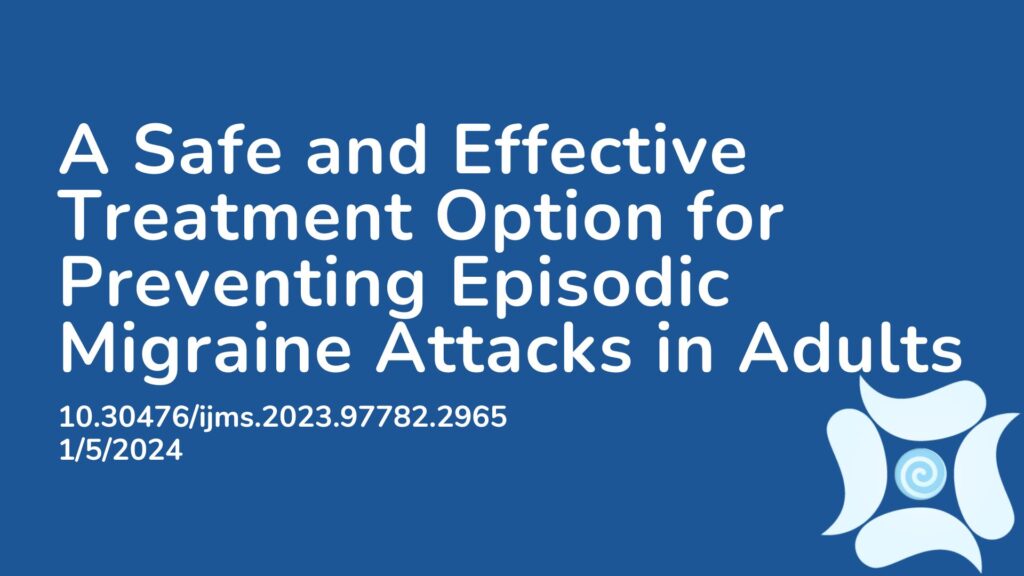Summary:
Migraine is one of the most prevalent neurological disorders, affecting approximately 12-20% of the general population. Migraines are recurrent headaches accompanied by symptoms such as nausea, vomiting, lethargy, and heightened sensitivity to light and sound, significantly impacting the quality of life. Current treatment options include beta-blockers as first-line choices and pain relief. However, these prophylactic medications are often inadequate and induce adverse effects. While the exact mechanisms underlying migraine remain unclear, evidence points to the involvement of the hypothalamus in its pathophysiology. Additionally, insomnia frequently accompanies migraine, affecting three out of four episodic migraine patients. Consequently, neuropeptides associated with hypothalamic pathways are being explored for migraine treatment. Among these neuropeptides, melatonin, renowned for its role in circadian rhythm regulation, stands out. Melatonin, naturally secreted by the pineal gland, modulates the circadian cycle and possesses antioxidant properties. Theoretically, melatonin could aid in migraine prophylaxis by regulating dopamine-glutamine activity and inhibiting calcitonin gene-related peptide (CGRP) release. This randomized, double-blind clinical trial aimed to assess melatonin’s efficacy in preventing episodic migraine attacks among patients. Sixty patients with episodic migraine were randomly assigned to receive either 3 mg melatonin or a placebo, in addition to their baseline pharmacological therapy, for two months. The results showed that post-treatment, the melatonin group experienced a greater reduction in the frequency and duration of attacks and analgesic use compared to the placebo group. However, the difference in attack severity between the two groups was not statistically significant. The authors concluded that melatonin is more effective than placebo in reducing the frequency and duration of migraine attacks. It is as safe as placebo and may be a viable option for the preventive treatment of episodic migraine in adults.
Abstract:
Background: There is no definite recommendation for melatonin supplementation in episodic migraine. This study aimed to evaluate the effect of melatonin on reducing the frequency and severity of migraine attacks. Methods: This randomized, double-blind clinical trial was conducted at Golestan Hospital of Ahvaz, Iran, in 2021. A total of 60 patients with episodic migraine were randomly assigned into 2 groups of receiving 3 mg melatonin (intervention group; n=30) or the same dose of placebo (control group; n=30) along with baseline therapy (propranolol 20 mg, BID) for two months. The attack frequency, attack duration, attack severity (based on VAS), the number of analgesic intakes, drug complications, Migraine Disability Assessment score (MIDAS), and Pittsburgh sleep quality index (PSQI) were evaluated at baseline and in the first, second, third, and fourth months of follow-up. The independent t test, chi-square, and analysis of variance (ANOVA) with repeated measures were used to compare variables between the two groups. Results: In both groups, the frequency, duration, and severity of attacks, taking analgesics, MIDAS, and PSQI scores during follow-up decreased significantly (P<0.001). After treatment, the mean frequency (P=0.032) and duration of attacks (P=0.001), taking analgesic (P<0.001), and MIDAS (P<0.001) and PSQI scores (P<0.001) in the melatonin group were lower than placebo. Only the attack severity was not significantly different between the two groups (P=0.126). Side effects were observed in two patients (6.7%) in the melatonin group and one patient (3.3%) in the placebo group (P>0.999). Conclusion: Our study shows that melatonin was more efficacious than the placebo in the reduction of frequency and duration of migraine attacks. It was equally safe as the placebo and might be effective in the preventive treatment of episodic migraine in adults.
Article Publication Date: 1/5/2024
DOI: 10.30476/ijms.2023.97782.2965



